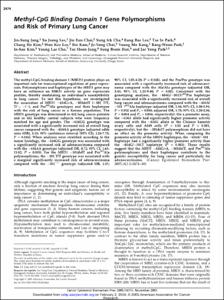KUMEL Repository
1. Journal Papers (연구논문)
1. School of Medicine (의과대학)
Dept. of Internal Medicine (내과학)
Methyl-CpG Binding Domain 1 Gene Polymorphisms and Risk of Primary Lung Cancer
- Keimyung Author(s)
- Han, Sung Beom
- Department
- Dept. of Internal Medicine (내과학)
- Journal Title
- Cancer Epidemiology, Biomarkers & Prevention
- Issued Date
- 2005
- Volume
- 14
- Issue
- 11
- Abstract
- The methyl-CpG binding domain 1 (MBD1) protein plays an important role for transcriptional regulation of gene expression. Polymorphisms and haplotypes of the MBD1 gene may have an influence on MBD1 activity on gene expression profiles, thereby modulating an individual's susceptibility to lung cancer. To test this hypothesis, we investigated the association of MBD1 −634G>A, −501delT (−501 T/T, T/−, −/−), and Pro401Ala genotypes and their haplotypes with the risk of lung cancer in a Korean population. The MBD1 genotype was determined in 432 lung cancer patients and in 432 healthy control subjects who were frequency matched for age and gender. The −634GG genotype was associated with a significantly increased risk of overall lung cancer compared with the −634AA genotype [adjusted odds ratio (OR), 3.10; 95% confidence interval (95% CI), 1.24-7.75; P = 0.016]. When analyses were stratified according to the tumor histology, the −634GG genotype was associated with a significantly increased risk of adenocarcinoma compared with the −634AA genotype (adjusted OR, 4.72; 95% CI, 1.61-13.82; P = 0.005). For the MBD1 −501delT and Pro401Ala polymorphisms, the −501 T/T genotype was associated with a marginal significantly increased risk of adenocarcinoma compared with the −501−/− genotype (adjusted OR, 2.07; 95% CI, 1.02-4.20; P = 0.045), and the Pro/Pro genotype was associated with a significantly increased risk of adenocarcinoma compared with the Ala/Ala genotype (adjusted OR, 3.41; 95% CI, 1.21-9.60; P = 0.02). Consistent with the genotyping analyses, the −634G/−501T/401Pro haplotype was associated with a significantly increased risk of overall lung cancer and adenocarcinoma compared with the −634A/−501−/401Ala haplotype (adjusted OR, 1.44; 95% CI, 1.08-1.91; P = 0.012 and Pc = 0.048; adjusted OR, 1.75; 95% CI, 1.20-2.56; P = 0.004 and Pc = 0.016, respectively). On a promoter assay, the −634A allele had significantly higher promoter activity compared with the −634G allele in the Chinese hamster ovary cells and A549 cells (P < 0.05 and P < 0.001, respectively), but the −501delT polymorphism did not have an effect on the promoter activity. When comparing the promoter activity of the MBD1 haplotypes, the −634A/−501− haplotype had a significantly higher promoter activity than the −634G/−501T haplotype (P < 0.001). These results suggest that the MBD1 −634G>A, −501delT, and Pro401Ala polymorphisms and their haplotypes contribute to the genetic susceptibility for lung cancer and particularly for adenocarcinoma.
- Keimyung Author(s)(Kor)
- 한승범
- Publisher
- School of Medicine
- Citation
- Jin-Sung Jang et al. (2005). Methyl-CpG Binding Domain 1 Gene Polymorphisms and Risk of Primary Lung Cancer. Cancer Epidemiology, Biomarkers & Prevention, 14(11), 2474–2480. doi: 10.1158/1055-9965.EPI-05-0423
- Type
- Article
- ISSN
- 1055-9965
- Appears in Collections:
- 1. School of Medicine (의과대학) > Dept. of Internal Medicine (내과학)
- 파일 목록
-
-
Download
 oak-aaa-00758.pdf
기타 데이터 / 271 kB / Adobe PDF
oak-aaa-00758.pdf
기타 데이터 / 271 kB / Adobe PDF
-
Items in Repository are protected by copyright, with all rights reserved, unless otherwise indicated.